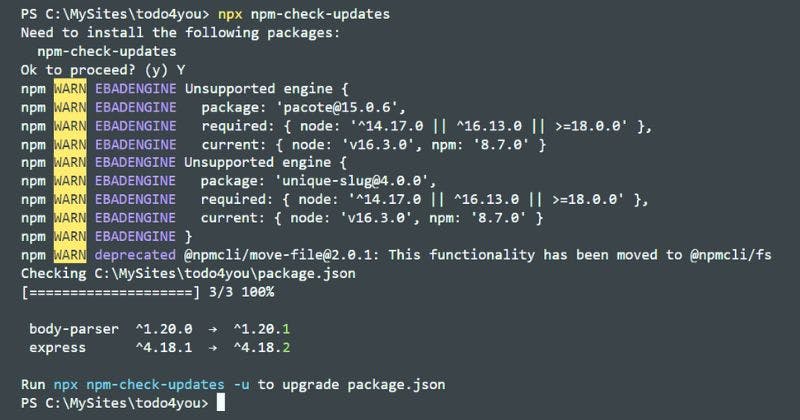dev-resources.site
for different kinds of informations.
How to Keep Project Dependencies Up-To-Date
If you are looking for a quick way to update your project dependencies to the latest versions, you are in the right place.
Due to bug patches, new features, and other changes, dependencies may eventually become out-of-date.
It becomes increasingly difficult to stay current with these upgrades the more project dependencies you have.
Packages that are out of date might compromise security and degrade performance. Vulnerabilities are prevented with updated packages.
This implies that regular dependency updates and checks are crucial.
You will discover how to accomplish it in only three or five optional steps in this article!
How to Check for Oudated Dependencies
It's vital to know that dependency package updates, even if it's a major version, may bring about breaking changes to your project.
Of course, upgrading dependencies is a blunt instrument. As you indicated, if the project is empty and nothing can break, it's okay.
On the other hand, if you're working on a more advanced project, you probably want to make sure that your dependencies haven't undergone any breaking changes before you upgrade.
For a quick overview of the number of dependency updates you need to first use npm oudated.
1. Check for Oudated Dependencies
The first step is to go to your project's directory and run:
$ npm outdated
Every installed dependency will be examined by this command, and the current version will be compared to the most recent version in the npm registry.
It prints out as a table detailing all of the new available versions.
There are no additional packages that need to be downloaded because it is built within npm.
For Yarn specific solution, refer to this StackOverflow answer.
How to Update Project Dependencies
Let's imagine you wish to update some dependencies in a project that has a few out-of-date ones.
Or maybe you ...
Consider that you wish to revisit a project of yours that has a little bit fallen by the wayside.
Regardless of the situation, you could question yourself:
- How should I update them?
- Should I update them all at once or one at a time?
- Which tools or commands should I employ?
The 'npm-check-updates' package, which brings your project dependencies up to date, is the solution.
You have two options for using the package: either install it globally or use npx.
2. Update the dependencies with NPX
The second step is to go to your project's directory and run:
$ npx npm-check-updates
The above command displays all the outdated dependencies from your project.
The image illustrates an example output. The output shows the current versions and the latest versions.
I'd suggest npm-check-updates for an additional sophisticated and adaptable upgrading experience.
This package offers some extra customization options in addition to all that npm obsolete and npm upgrades can accomplish.
However, a package installation might be necessary.
Install the npm-check-updates package globally to get going:
3. Update the dependencies Globally
The third step (optional) is to go to your project's directory and run:
$ npm-check-updates -u
The command doesn't automatically install the new versions. It just overwrites your package.json file with the latest versions.
That means you have to install them yourself, which takes us to the fourth step and fifth steps.
How to Install New Dependency Versions
4. Install Package Globally
The fourth step (optional) is to go to your project's directory and run:
npm install -g npm-check-updates
5. Install the new versions
The last step is to install the new versions by running:
$ npm install
// or
$ yarn install
After this, you are done! The project will use the latest versions.
Conclusion
Consistently updating your dependencies will improve the efficiency and security of your apps.
Useful tools to check for packages that need a version upgrade are npm outdated and npm-check-updates.
I advise testing them both to determine which offers a better developer experience.
I'm hoping that these techniques will be useful as you update your project dependencies!
Featured ones:


